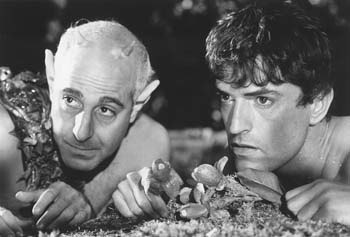![[Metroactive Movies]](/movies/gifs/movies468.gif)
[ Movies Index | Show Times | Metro | Metroactive Central | Archives ]
Long-Eared Galoot
 The Ears Have It: Stanley Tucci (left) and Rupert Everett Kevin Kline is the best part of 'A Midsummer Night's Dream' By Richard von Busack THE MOST MEMORABLE scene in A Midsummer Night's Dream is the vision of a queen enamored of a donkey. Hasn't that image made this play a favorite? So many of us men are loved beyond our deserts. The play also contains the most sustained comic scene Shakespeare ever wrote: a parody of bad acting titled The Lamentable Comedy and Most Cruel Death of Pyramus and Thisbe. In the often wonderful new film version--awkwardly titled William Shakespeare's A Midsummer Night's Dream--the playlet is acted out by Kevin Kline as the amateur thespian Nick Bottom (against Sam Rockwell as Francis Flute). Certain tendencies Shakespeare observed in bad actors still flourish today. For example, a star's belief that he can play anything--a wall, a lion, a tyrant, a maiden. Shakespeare also marked the way an actor softens up tough material to sop the audience (consider the career of Robin Williams). As the moon-crossed lovers, Kline and Rockwell trade high-flown dialogue: "O, grim-visaged night! O, night with hue so black! O, night, which ever art where day is not!" Director Michael Hoffman (Soapdish) throws a wicked curve ball in the last scenes, lining the comedy with tragedy. His Bottom is a butt, you might say, humiliated as an actor and stuck in a sad marriage. All of which makes his own donkey romance with Michelle Pfeiffer's Titania even more ravishing. He lies with Titania, a golden odalisque, in her nest as large as a queen-sized bed. Kline, the ass, reads his lines in a hoarse, folksy murmur that has tones of Chill Wills' voice for Francis the Talking Mule. Now for the bad news: Calista Flockhart. Her performance here raises an important question: does a weak performer encourage a misconception or does the misconception come first and the bad performer follow? Flockhart's Helena is featured in all of Hoffman's worst ideas, including a mud-wrestling match with Hermia (Anna Friel, a cross between Bernadette Peters and Meg Tilly). Flockhart, who spends the play pleading for love, is like Ally McBard. Her line "We should be wooed and were not meant to woo" is too much like something she'd whine on that unwatchable retrograde TV show of hers. And Hoffman directs with too much turn-of-the-century Tuscan brio. Imagine having urchins empty bottles of wine on Bottom when a rotten tomato would do the job so much better. (Who wastes good wine on a bad actor?) Surprisingly, what seemed like the weirdest miscasting works well. Stanley Tucci's Puck fawns, so to speak, on the authority of his king. And when recognized ("You are that shrewd and knavish sprite"), he dismisses the praise with a wave of the hand that says, "Please, no photographs." As Pyramus and Thisbe demonstrates, sometimes hokeyness and clumsiness can be appealing, and the coarse moments in this production are always redeemed with something elegant later. Like Titania and Bottom, the film's celestial and asinine qualities complement each other.
William Shakespeare's A Midsummer Night's Dream (PG-13; 110 min.), directed and written by Michael Hoffmann, adapted from the play by William Shakespeare, photographed by Oliver Stapleton and starring Kevin Kline, Michelle Pfeiffer, Stanley Tucci and Calista Flockhart, plays at selected theaters valleywide. [ San Jose | Metroactive Central | Archives ]
|
From the May 20-26, 1999 issue of Metro.
Copyright © Metro Publishing Inc. Maintained by Boulevards New Media.